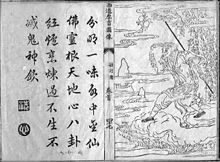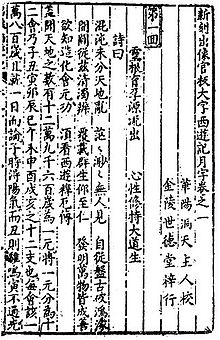- Wu Cheng'en
-
Wu Cheng'en (simplified Chinese: 吴承恩; traditional Chinese: 吳承恩; pinyin: Wú Chéng'ēn, ca. 1500–1582[1] or 1505–1580[2]), courtesy name Ruzhong (汝忠), pen name "Sheyang Hermit," was a Chinese novelist and poet of the Ming Dynasty, best known for being the attributed author of one of the Four Great Classical Novels of Chinese literature, Journey to the West.
Contents
Biography
Wu was born in Lianshui, in Jiangsu province, and later moved to nearby Huaian.[2][1][3] Wu's father, Wu Rui, had had a good primary education and "shown an aptitude for study,"[1] but ultimately spent his life as an artisan because of his family's financial difficulties. Nevertheless, Wu Rui continued to "devote himself to literary pursuits," and as a child Wu acquired the same enthusiasm for literature—including classical literature, popular stories, and anecdotes.[1][3]
He took the imperial examinations several times in attempt to become a mandarin, or imperial official, but never passed, and did not gain entry into the imperial university in Nanjing until middle age; after that he did become an official and had postings in both Beijing[4] and Changxing County,[1] but he did not enjoy his work, and eventually resigned, probably spending the rest of his life writing stories and poems in his hometown.[1] During this time he became an accomplished writer, producing both poetry and prose, and became friends with several prominent contemporary writers. Wu remained poor throughout his life, however, and did not have any children;[3] dissatisfied with the political climate of the time and with the corruption of the world, he spent much of his life as a hermit.[1]
Literary work
Journey to the West
Wu is best known for writing the classic Journey to the West,[5] one of the Four Great Classical Novels of Chinese literature. Wu is widely thought to be the author who published the work in anonymity due to the social pressures at the time. At the time when Wu lived, there was a trend in Chinese literary circles to imitate the classical literature of the Qin, Han, and Tang dynasties, written in Classical Chinese;[1][3] late in life, however, Wu went against this trend by apparently writing the novel, Journey to the West in the vernacular tongue.[3] Because of the ill repute of "vulgar" literature at the time, it is believed Wu published the novel anonymously. For over three centuries most of China remained unaware of its authorship, although the people of his hometown attributed the novel to him early on.[3]
Still, the novel's authorship is not certain, as the novel was published anonymously, and Wu did not reference the work in any other of his writings.[3] However, several scholars' textual analysis and research of Qing Dynasty records suggests that he may have been the author,[1] and a 1625 gazetteer from Wu's hometown claims him as the author.[3] Still, there remains doubts to the author of the novel. Translator W.F.J. Jenner, for example, points out that although Wu had knowledge of Chinese bureaucracy and politics, the novel itself doesn't include any political details that "a fairly well-read commoner could not have known."[4] Furthermore, it is unknown how much of the novel Wu or whoever the true author was actually created, and how much he simply compiled and edited, since much of the legend behind Journey to the West already existed in folk tales.[4] Nevertheless, the Journey to the West is the most authoritative version of these stories, as no competing story has appeared since they were compiled in this novel,[4] and Wu has become inextricably linked with the book and is seen as the generally accepted author, even if some doubts remain.[1]
Other works
In addition to Journey to the West, Wu wrote numerous poems and stories (including the novel Yuding Animals, which includes a preface by Wu), although most have been lost. Some of his work survives because, after his death, a family member gathered as many manuscripts as he could find and compiled them into four volumes, entitled Remaining Manuscripts of Mr. Sheyang.[1] Some of his poetry was included in contemporary anthologies such as A Digest of Ming Poetry and A Record of Ming Poetry.[1]
Both his poetry and his prose have been described as "stubborn" and critical of society's corruption, and in one of his few surviving poems Wu describes himself as having a "defiant spirit.[1] Wu's poetry focused on the expression of emotions, and for this reason his work has been compared to that of Li Bai,[5] although even the poems that he published with his name attached still were not quite modeled on the classical styles (although they were not as "vulgar" as Journey to the West).[1] In addition to using his writing to critique society, Wu also took pride in the worldly nature of his work, as opposed to the more fantastic writings of some contemporaries; in the preface to Yuding Animals he wrote, "My book does not just deal with the supernatural; it deals with the foibles of men too."[1]
Notes
- ^ a b c d e f g h i j k l m n o Shi Changyu (1999). "Introduction." in trans. W.J.F. Jenner, Journey to the West, volume 1. Seventh Edition. Beijing: Foreign Languages Press. pp. 1–22.
- ^ a b Waley, Arthur (1942). "Preface". Monkey. New York: Grove Press. pp. 7–8.
- ^ a b c d e f g h Hu Shih (1942). "Introduction". Monkey. New York: Grove Press. pp. 1–5.
- ^ a b c d Jenner, W.J.F. (1984). "Translator's Afterword." in trans. W.J.F. Jenner, Journey to the West, volume 4. Seventh Edition.
- ^ a b "www.renditions.org : Wu Cheng'en". http://www.renditions.org/renditions/authors/wuce.html. Retrieved 18 February 2008.
References
- Zhou, Xianshen, "Wu Cheng'en". Encyclopedia of China, 1st ed.
Categories:- Ming Dynasty novelists
- Chinese-language writers
- Journey to the West
- Chinese historical novelists
- Ming Dynasty poets
- 1500s births
- 1580s deaths
- Mythopoeic writers
- Fantasy writers
Wikimedia Foundation. 2010.


